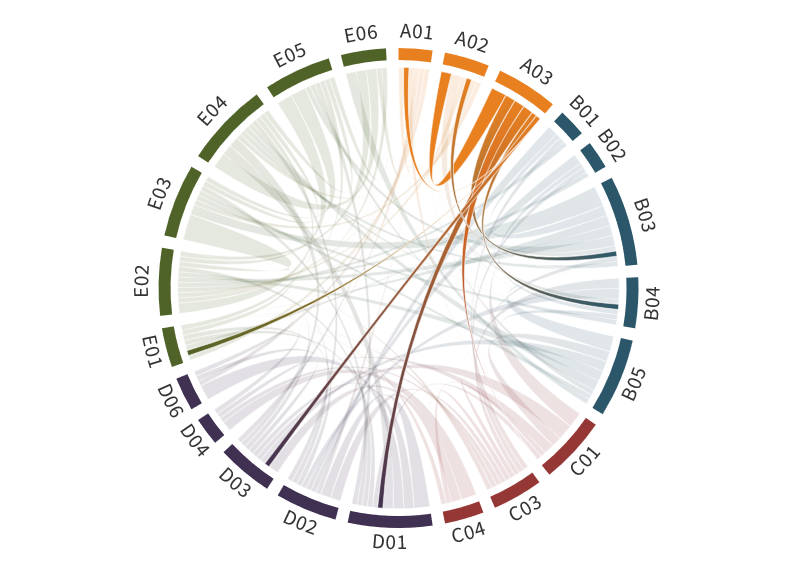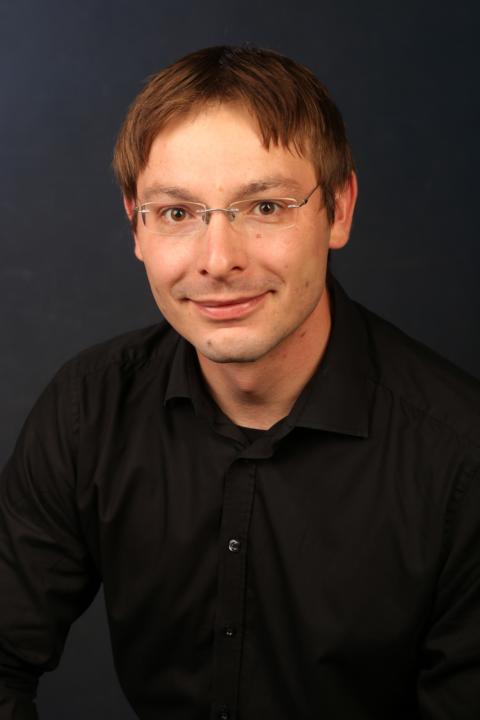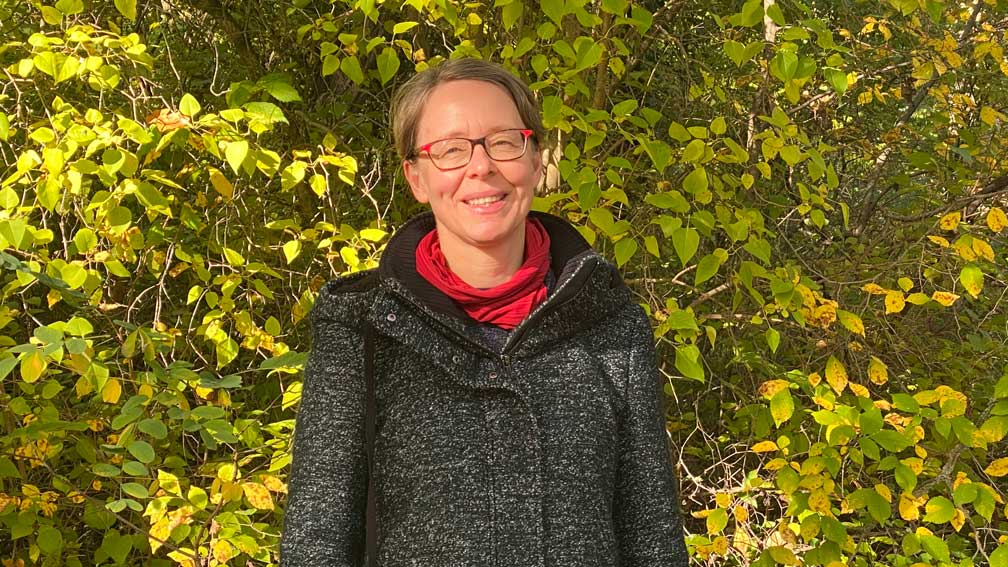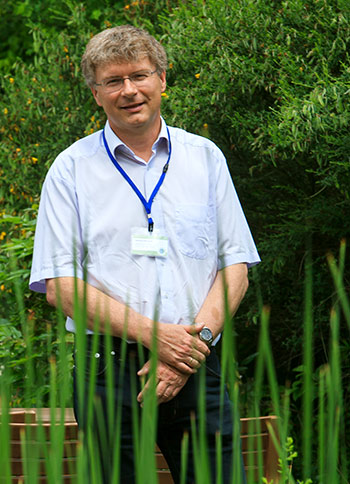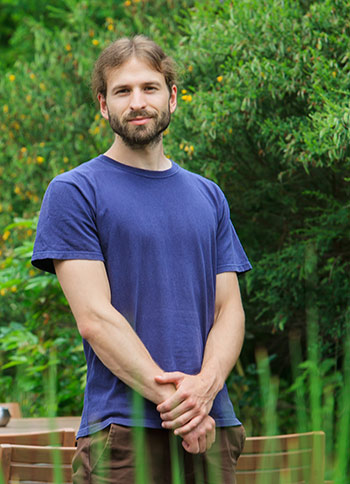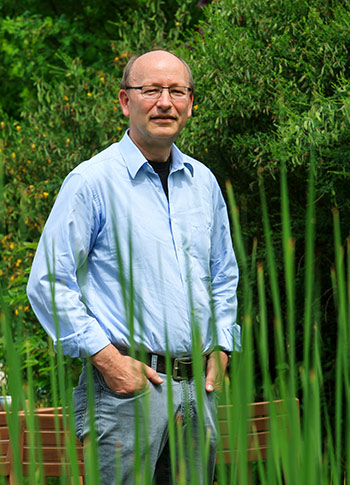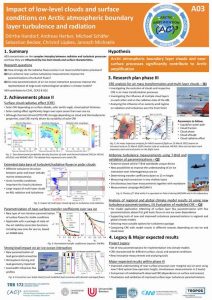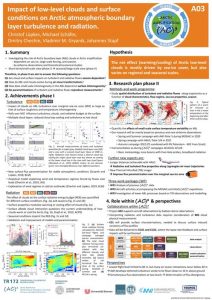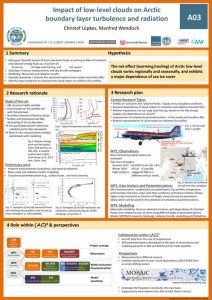A03: Impact of low-level clouds and surface conditions on Arctic atmospheric boundary layer turbulence and radiation
PIs: Dörthe Handorf, Andreas Herber, Michael Schäfer (former PIs: Christof Lüpkes, Manfred Wendisch)
A detailed understanding of Arctic amplification requires to study cloud processes in the Arctic atmospheric boundary layer (ABL). A03 concentrates on the complex interplay between radiative andturbulent processes and how they are influenced by low-level clouds and surface characteristics. Three topics were on the agenda during phases I and II: The first topic investigated the warming or cooling effect of the near-surface air by clouds (cloud radiative effect, CRE). Based on the observations of five seasonally different airborne campaigns it was found that the terrestrial CRE is a strong function of cloud and thermodynamic properties of the ABL. However, it showed weak differences between the seasons and surface types. We concluded that the solar CRE drives the variability of the total CRE with a cooling effect of clouds over open ocean and a mostly warming impact over sea ice, which vanishes for low solar zenith angles (SZA). The second topic aimed at a better understanding of the cloud impact on Arctic ABL processes. Results showed that, independent on season, clouds strongly affect the ABL due to their interaction with radiation and turbulence. In the third topic, new parameterizations of turbulent transport in stable stratification were developed, for easy implementation in climate models.
The airborne (AC)³ data sets as well as the new parameterizations provide huge potential for further research. Therefore, more detailed data analyses are planned in phase III, focusing on the evolution of the CRE in air mass transformation processes and extensions of the analysis from single- to multilayer cloud cases. A special focus will also be on the impact of surface inhomomgeneity on ABL processes and their interplay with cloud-related processes. However, the previous (AC)³ aircraft data were limited to the height of 60 m because of safety rules. Therefore, in phase III, we will use the newly developed towed aircraft sonde T-Bird for turbulence measurements. With measurements at altitudes of 15-20 m above the surface, shallow internal boundary layers can be reached. As a result, height corrections of drag coefficients to the usual reference height of 10 m will have only a minor impact as compared to corrections from previous campaign data. Together with results from a thermal-infrared imager that was introduced by Schäfer et al. (2022) and operated during HALO–(AC)³ in March/April 2022, this will lead to improved parameterizations of near-surface processes. This will be done on the basis of parameterizations developed so far in A03 and in previous work by A03 scientists concerning surface roughness (Lüpkes et al., 2015). Finally, the parameterization concept developed in A03 allows efficient sensitivity tests in climate models. The impact of the parameterizations, e.g., in regional and global models, will be analyzed together with modeling projects. Vice versa, this will further improve the parameterizations. Furthermore, the data concerning the CRE allow us to identify weaknesses of regional models concerning the cloud impact on radiation and turbulence by comparing model results with measurements.
Hypothesis:
Arctic atmospheric boundary layer clouds and near-surface processes significantly contribute to Arctic amplification.
Specific questions which will be answered in the project are:
- How do the radiative fluxes evolve in air mass transformation processes?
- Can airborne near-surface turbulence measurements improve the parameterizations of turbulent fluxes?
- Do new parameterizations of air-ice-ocean interaction processes improve the representation of large scale meteorological variables in climate models?
The investigations contribute to the strategic question SQ1, by quantifying the warming or cooling effect of clouds on the Arctic surface in different conditions and the clouds’ impact on mixing processes influencing the lapse rate.
Achievements phase II
- A seasonal and surface dependent quantification of the solar and terrestrial contributions to the CRE was performed.
- Analysis of fluxes in the ABL reveal large impact of multi-layer clouds and distinct differences to lower latitude marine stratocumulus clouds.
- New turbulence parameterizations for stable boundary layer and convection over leads were developed.
- Large Foehn impact was shown on snow melt in Svalbard and northern Fram Strait flow regimes.
Achievements phase I
A03 has quantified the cooling/warming effects of clouds as a function of surface properties using low-level aircraft measurements during ACLOUD and AFLUX (Stapf et al., 2019a). Measured radiation fields below clouds were compared with results of ICON simulations with 2.4 km resolution (Wendisch et al., 2019). It became apparent, that the measured surface albedo fields needed to be considered in the simulation to realistically represent the mode structure of the measured net radiation field by the ICON model. A large variability of the turbulent flux profiles inside the clouds depending on radiative cooling at cloud top was observed. A new parameterisation of the stability dependence of transfer coefficients for momentum, heat, and moisture was developed (Gryanik and Lüpkes, 2018). Furthermore, the warming effect of leads was quantified as a function of wind speed (Chechin et al., 2019). It was shown that leads might play a key role for the often observed development of decoupling between the sea ice surface temperature and the boundary layer temperature (Chechin and Lüpkes, 2019).
Role within (AC)³
Members
Sebastian Becker
PhD
University of Leipzig
Leipzig Institute for Meteorology (LIM)
Stephanstr. 3
04103 Leipzig
Dr. Michael Schäfer
PI
University of Leipzig
Leipzig Institute for Meteorology (LIM)
Stephanstr. 3
04103 Leipzig
Joshua Müller
PhD
University of Leipzig
Leipzig Institute for Meteorology (LIM)
Stephanstr. 3
04103 Leipzig
phone:
e-mail:
Dr. Andreas Herber
Principal Investigator
Alfred-Wegener-Institute Helmholtz Center for Polar and Marine Research (AWI)
Bussestraße 24
27570 Bremerhaven
Dr. Dörthe Handorf
Principal Investigator
Alfred Wegener Institute
Telegrafenberg A45
14473 Potsdam
Benjamin Kirbus
PhD (associated)
University of Leipzig
Leipzig Institute for Meteorology (LIM)
Stephanstr. 3
04103 Leipzig
Former Members
Prof. Dr. Manfred Wendisch
Principal Investigator
University of Leipzig
Leipzig Institute for Meteorology (LIM)
Stephanstr. 3
04103 Leipzig
Dr. Johannes Stapf
PhD (in phase I)
University of Leipzig
Leipzig Institute for Meteorology (LIM)
Stephanstr. 3
04103 Leipzig
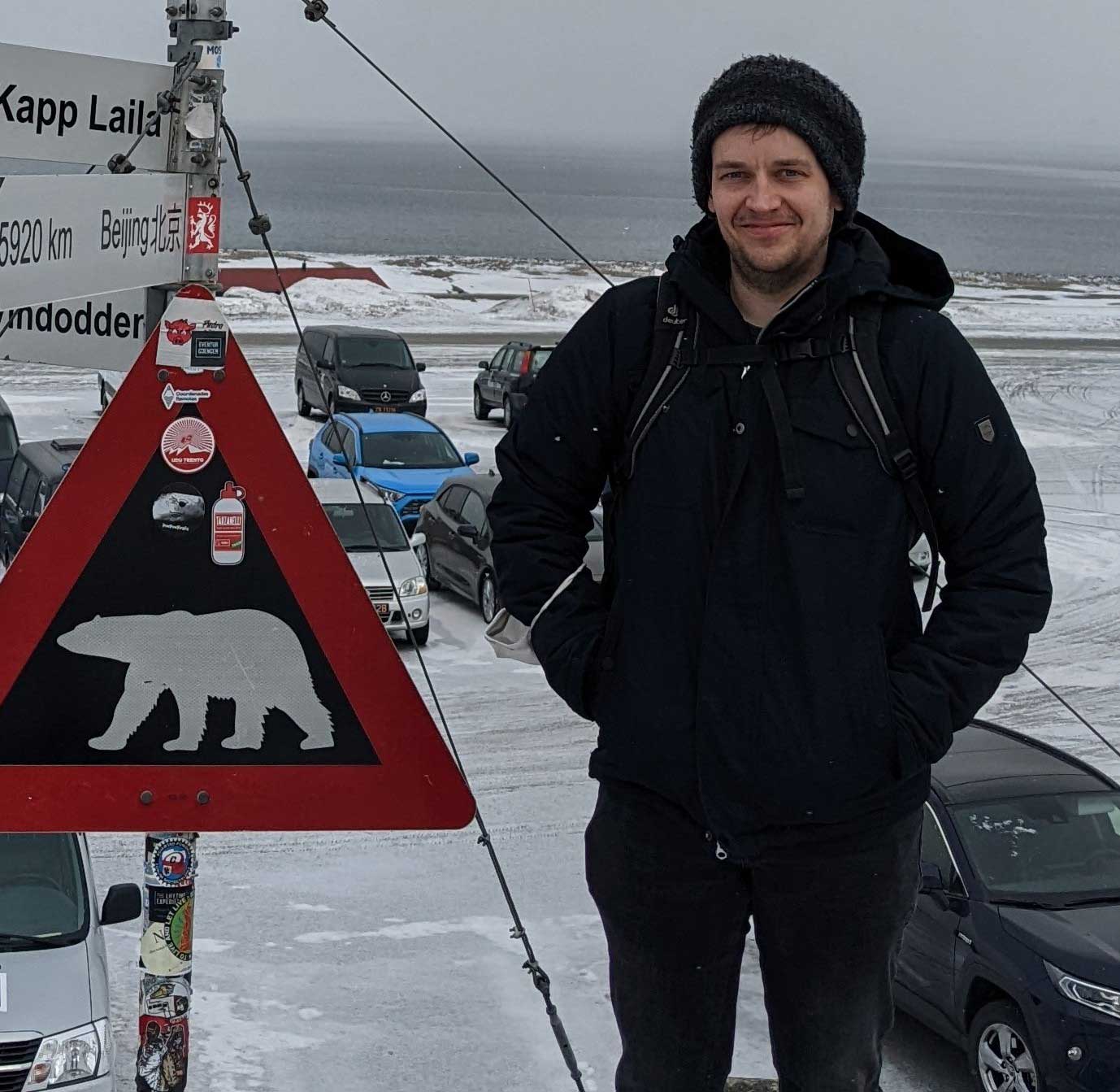
Dr. Janosch Michaelis
Postdoc (in phase II)
Alfred-Wegener-Institute Helmholtz Center for Polar and Marine Research (AWI)
Bussestraße 24
27570 Bremerhaven

Dr. Dmitry Chechin
Postdoc (in phase I)
Alfred-Wegener-Institute Helmholtz Center for Polar and Marine Research (AWI)
Bussestraße 24
27570 Bremerhaven
Dr. Christof Lüpkes
Principal Investigator
Alfred-Wegener-Institute Helmholtz Center for Polar and Marine Research (AWI)
Am Handelshafen 12
27570 Bremerhaven
Publications
2024
2023
B. Kirbus, J. Chylik, A. Ehrlich, S. Becker, M. Schäfer, R. Neggers, M. Wendisch, 2023; Analysis of an Arctic cold air outbreak during autumn and related air mass transformations forced by surface changes and advection in higher altitudes. Elem. Sci. Anth.; 11 (1): 00079, https://doi.org/10.1525/elementa.2023.00079
Wendisch, M., Stapf, J., Becker, S., Ehrlich, A., Jäkel, E., Klingebiel, M., Lüpkes, C., Schäfer, M., and Shupe, M. D., 2023: Effects of variable ice–ocean surface properties and air mass transformation on the Arctic radiative energy budget, Atmos. Chem. Phys., 23, 9647–9667, https://doi.org/10.5194/acp-23-9647-2023.
Schmitt, A. U. and Lüpkes, C., 2023: Attributing near-surface atmospheric trends in the Fram Strait region to regional sea ice conditions, The Cryosphere, 17, 3115–3136, https://doi.org/10.5194/tc-17-3115-2023
E. Jäkel, S. Becker, T.R. Sperzel, H. Niehaus, G. Spreen, R. Tao, M. Nicolaus, W. Dorn, A. Rinke, J. Brauchle, M. Wendisch, 2023: Observations and modeling of areal surface albedo and surface types in the Arctic, EGUsphere [preprint], https://doi.org/10.5194/egusphere-2023-1337.
Chechin, D. G., Lüpkes, C., Hartmann, J., Ehrlich, A., and Wendisch, M., 2023: Turbulent structure of the Arctic boundary layer in early summer driven by stability, wind shear and cloud-top radiative cooling: ACLOUD airborne observations, Atmos. Chem. Phys., 23, 4685–4707, https://doi.org/10.5194/acp-23-4685-2023.
Moser, M.; Voigt, C.; Jurkat-Witschas, T.; Hahn, V.; Mioche, G.; Jourdan, O.; Dupuy, R.; Gourbeyre, C.; Schwarzenboeck, A.; Lucke, J.; Boose, Y.; Mech, M.; Borrmann, S.; Ehrlich, A.; Herber, A.; Lüpkes, C. & Wendisch, M., 2023: Microphysical and thermodynamic phase analyses of Arctic low-level clouds measured above the sea ice and the open ocean in spring and summer, Atmos. Chem. Phys., 23, 7257–7280, https://doi.org/10.5194/acp-23-7257-2023
Becker, S., Ehrlich, A., Schäfer, M., and Wendisch, M., 2023: Airborne observations of the surface cloud radiative effect during different seasons over sea ice and open ocean in the Fram Strait, Atmos. Chem. Phys., 23, 7015–7031, https://doi.org/10.5194/acp-23-7015-2023
Wendisch, M.; Brückner, M.; Crewell, S.; Ehrlich, A.; Notholt, J.; Lüpkes, C.; Macke, A.; Burrows, J. P.; Rinke, A.; Quaas, J.; Maturilli, M.; Schemann, V.; Shupe, M. D.; Akansu, E. F.; Barrientos-Velasco, C.; Bärfuss, K.; Blechschmidt, A.-M.; Block, K.; Bougoudis, I.; Bozem, H.; Böckmann, C.; Bracher, A.; Bresson, H.; Bretschneider, L.; Buschmann, M.; Chechin, D. G.; Chylik, J.; Dahlke, S.; Deneke, H.; Dethloff, K.; Donth, T.; Dorn, W.; Dupuy, R.; Ebell, K.; Egerer, U.; Engelmann, R.; Eppers, O.; Gerdes, R.; Gierens, R.; Gorodetskaya, I. V.; Gottschalk, M.; Griesche, H.; Gryanik, V. M.; Handorf, D.; Harm-Altstädter, B.; Hartmann, J.; Hartmann, M.; Heinold, B.; Herber, A.; Herrmann, H.; Heygster, G.; Höschel, I.; Hofmann, Z.; Hölemann, J.; Hünerbein, A.; Jafariserajehlou, S.; Jäkel, E.; Jacobi, C.; Janout, M.; Jansen, F.; Jourdan, O.; Jurányi, Z.; Kalesse-Los, H.; Kanzow, T.; Käthner, R.; Kliesch, L. L.; Klingebiel, M.; Knudsen, E. M.; Kovács, T.; Körtke, W.; Krampe, D.; Kretzschmar, J.; Kreyling, D.; Kulla, B.; Kunkel, D.; Lampert, A.; Lauer, M.; Lelli, L.; von Lerber, A.; Linke, O.; Löhnert, U.; Lonardi, M.; Losa, S. N.; Losch, M.; Maahn, M.; Mech, M.; Mei, L.; Mertes, S.; Metzner, E.; Mewes, D.; Michaelis, J.; Mioche, G.; Moser, M.; Nakoudi, K.; Neggers, R.; Neuber, R.; Nomokonova, T.; Oelker, J.; Papakonstantinou-Presvelou, I.; Pätzold, F.; Pefanis, V.; Pohl, C.; van Pinxteren, M.; Radovan, A.; Rhein, M.; Rex, M.; Richter, A.; Risse, N.; Ritter, C.; Rostosky, P.; Rozanov, V. V.; Donoso, E. R.; Saavedra-Garfias, P.; Salzmann, M.; Schacht, J.; Schäfer, M.; Schneider, J.; Schnierstein, N.; Seifert, P.; Seo, S.; Siebert, H.; Soppa, M. A.; Spreen, G.; Stachlewska, I. S.; Stapf, J.; Stratmann, F.; Tegen, I.; Viceto, C.; Voigt, C.; Vountas, M.; Walbröl, A.; Walter, M.; Wehner, B.; Wex, H.; Willmes, S.; Zanatta, M. & Zeppenfeld, S., 2023: Atmospheric and Surface Processes, and Feedback Mechanisms Determining Arctic Amplification: A Review of First Results and Prospects of the (AC)³ Project, Bull. Am. Meteorol. Soc., American Meteorological Society, 104, E208–E242, https://doi.org/10.1175/bams-d-21-0218.1
Chylik, J., Chechin, D., Dupuy, R., Kulla, B. S., Lüpkes, C., Mertes, S., Mech, M., and Neggers, R. A. J., 2023: Aerosol impacts on the entrainment efficiency of Arctic mixed-phase convection in a simulated air mass over open water, Atmos. Chem. Phys., https://doi.org/10.5194/acp-23-4903-2023.
2022
M. Mech, A. Ehrlich, A. Herber, C. Lüpkes, M. Wendisch, S. Becker, Y. Boose, D. Chechin, S. Crewell, R. Dupuy, C. Gourbeyre, J. Hartmann, E. Jäkel, O. Jourdan, L.-L. Kliesch, M. Klingebiel, B. S. Kulla, G. Mioche, M. Moser, N. Risse, E. Ruiz-Donoso, M. Schäfer, J. Stapf & C. Voigt, 2022, MOSAiC-ACA and AFLUX – Arctic airborne campaigns characterizing the exit area of MOSAiC. Sci Data 9, 790. https://doi.org/10.1038/s41597-022-01900-7
Gryanik, V.M., Lüpkes, C. (2022): A Package of Momentum and Heat Transfer Coefficients for the Stable Surface Layer Extended by New Coefficients over Sea Ice. Boundary-Layer Meteorol. https://doi.org/10.1007/s10546-022-00730-9
Michaelis, J., Schmitt, A. U., Lüpkes, C., Hartmann, J., Birnbaum, G., and Vihma, T., 2022: Observations of marine cold-air outbreaks: a comprehensive data set of airborne and dropsonde measurements from the Springtime Atmospheric Boundary Layer Experiment (STABLE), Earth Syst. Sci. Data, 14, 1621–1637, https://doi.org/10.5194/essd-14-1621-2022.
Geerts, B.; Giangrande, S. E.; McFarquhar, G. M.; Xue, L.; Abel, S. J.; Comstock, J. M.; Crewell, S.; DeMott, P. J.; Ebell, K.; Field, P.; Hill, T. C. J.; Hunzinger, A.; Jensen, M. P.; Johnson, K. L.; Juliano, T. W.; Kollias, P.; Kosovic, B.; Lackner, C.; Luke, E.; Lüpkes, C.; Matthews, A. A.; Neggers, R.; Ovchinnikov, M.; Powers, H.; Shupe, M. D.; Spengler, T.; Swanson, B. E.; Tjernström, M.; Theisen, A. K.; Wales, N. A.; Wang, Y.; Wendisch, M. & Wu, P., 2022: The COMBLE Campaign: A Study of Marine Boundary Layer Clouds in Arctic Cold-Air Outbreaks, Bull. Am. Meteorol. Soc., 103, E1371 – E1389, https://doi.org/10.1175/BAMS-D-21-0044.1
Becker, S., Ehrlich, A., Jäkel, E., Carlsen, T., Schäfer, M., and Wendisch, M., 2022: Airborne measurements of directional reflectivity over the Arctic marginal sea ice zone, Atmos. Meas. Tech., 15, 2939–2953, https://doi.org/10.5194/amt-15-2939-2022.
Schäfer, M., Wolf, K., Ehrlich, A., Hallbauer, C., Jäkel, E., Jansen, F., Luebke, A. E., Müller, J., Thoböll, J., Röschenthaler, T., Stevens, B., and Wendisch, M., 2022: VELOX – a new thermal infrared imager for airborne remote sensing of cloud and surface properties, Atmos. Meas. Tech., 15, 1491–1509, https://doi.org/10.5194/amt-15-1491-2022.
Michaelis, J. and Lüpkes, C., 2022: The Impact of Lead Patterns on Mean Profiles of Wind, Temperature, and Turbulent Fluxes in the Atmospheric Boundary Layer over Sea Ice. Atmosphere, 13, 148. https://doi.org/10.3390/atmos13010148
Shupe, M.D., M. Rex, B. Blomquist, P.O.G. Persson, J. Schmale, T. Uttal, D. Althausen, H. Angot, S. Archer, L. Bariteau, I. Beck, J. Bilberry, S. Bussi, C. Buck, M. Boyer, Z. Brasseur, I.M. Brooks, R. Calmer, J. Cassano, V. Castro, D. Chu, D. Costa, C.J. Cox, J. Creamean, S. Crewell, S. Dahlke, E. Damm, G. de Boer, H. Deckelmann, K. Dethloff, M. Dütsch, K. Ebell, A. Ehrlich, J. Ellis, R. Engelmann, A.A. Fong, M.M. Frey, M.R. Gallagher, L. Ganzeveld, R. Gradinger, J. Graeser, V. Greenamyer, H. Griesche, S. Griffiths, J. Hamilton, G. Heinemann, D. Helmig, A. Herber, C. Heuzé, J. Hofer, T. Houchens, D. Howard, J. Inoue, H.-W. Jacobi, R. Jaiser, T. Jokinen, O. Jourdan, G. Jozef, W. King, A. Kirchgaessner, M. Klingebiel, M. Krassovski, T. Krumpen, A. Lampert, W. Landing, T. Laurila, D. Lawrence, B. Loose, M. Lonardi, C. Lüpkes, M. Maahn, A. Macke, W. Maslowski, C. Marsay, M. Maturilli, M. Mech, S. Morris, M. Moser, M. Nicolaus, P. Ortega, J. Osborn, F. Pätzold, D.K. Perovich, T. Petäjä, C. Pilz, R. Pirazzini, K. Posman, H. Powers, K.A. Pratt, A. Preußer, L. Quéléver, M. Radenz, B. Rabe, A. Rinke, T. Sachs, A. Schulz, H. Siebert, T. Silva, A. Solomon, A. Sommerfeld, G. Spreen, M. Stephens, A. Stohl, G. Svensson, J. Uin, J. Viegas, C. Voigt, P. von der Gathen, B. Wehner, J.M. Welker, M. Wendisch, M. Werner, Z. Xie, F. Yue, 2022: Overview of the MOSAiC expedition – Atmosphere. Elementa: Science of the Anthropocene, 10 (1): 00060, https://doi.org/10.1525/elementa.2021.00060.
Schneider, T., C. Lüpkes, W. Dorn, D. Chechin, D. Handorf, S. Khosravi, V.M. Gryanik, I. Makhotina, and A. Rinke, 2022: Sensitivity to changes in the surface-layer turbulence parameterization for stable conditions in winter: A case study with a regional model over the Arctic, Atm. Sci. Lett., 23, e1066, https://doi.org/10.1002/asl.1066
2021
Stapf, J., 2021: Influence of Surface and Atmospheric Thermodynamic Properties on the Cloud Radiative Forcing and Radiative Energy Budget in the Arctic, Dissertation, Universität Leipzig, https://nbn-resolving.org/urn:nbn:de:bsz:15-qucosa2-777567.
Gryanik, V. M., Lüpkes, C., Sidorenko, D., and Grachev, A., 2021. A universal approach for the non-iterative parametrization of near-surface turbulent fluxes in climate and weather prediction models. J. Adv. Model. Earth Syst., 13, e2021MS002590. https://doi.org/10.1029/2021MS002590
Shestakova, A. A., Chechin, D. G., Lüpkes, C., Hartmann, J., and Maturilli, M., 2022: The foehn effect during easterly flow over Svalbard, Atmos. Chem. Phys., 22, 1529–1548, https://doi.org/10.5194/acp-22-1529-2022.
., ., , .2021: Modelling and parametrization of the convective flow over leads in sea ice and comparison with airborne observations. QJR Meteorol Soc. ; 147: 914– 943. https://doi.org/10.1002/qj.3953
Stapf, J., Ehrlich, A., and Wendisch, M., 2021. Influence of thermodynamic state changes on surface cloud radiative forcing in the Arctic: a comparison of two approaches using data from AFLUX and SHEBA. J. Geophys. Res., 126, e2020JD033589. https://doi.org/10.1029/2020JD033589
2020
Michaelis, J., 2020: Modelling and parametrization of turbulent convective processes over leads in sea ice (Doctoral dissertation), Universität Bremen. doi: 10.26092/elib/428
Stapf, J., Ehrlich, A., Jäkel, E., Lüpkes, C., and Wendisch, M., 2020: Reassessment of shortwave surface cloud radiative forcing in the Arctic: consideration of surface-albedo–cloud interactions, Atmos. Chem. Phys., 20, 9895–9914, https://doi.org/10.5194/acp-20-9895-2020.
Michaelis, J., Lüpkes, C., Zhou, X., Gryschka, M., & Gryanik, V. M., 2020: Influence of lead width on the turbulent flow over sea ice leads: Modeling and parametrization. Journal of Geophysical Research: Atmospheres, 125, e2019JD031996. https://doi.org/10.1029/2019JD031996
Gryanik V.M., Lüpkes C., Grachev A., Sidorenko, D., 2020: New modified and extended stability functions for the stable boundary layer based on SHEBA and parametrizations of bulk transfer coefficients for climate models, J. Atmos. Sci., DOI: 10.1175/JAS-D-19-0255.1
2019
Ehrlich, A., M. Wendisch, C. Lüpkes, M. Buschmann, H. Bozem, D. Chechin, H.-C. Clemen, R. Dupuy, O. Eppers, J. Hartmann, A. Herber, E. Jäkel, E. Järvinen, O. Jourdan, U. Kästner, L.-L. Kliesch, F. Köllner, M. Mech, S. Mertes, R. Neuber, E. Ruiz-Donoso, M. Schnaiter, J. Schneider, J. Stapf, and M. Zanatta, 2019: A comprehensive in situ and remote sensing data set from the Arctic CLoud Observations Using airborne measurements during polar Day (ACLOUD) campaign, Earth Syst. Sci. Data, https://doi.org/10.5194/essd-11-1853-2019
Chechin D.G., I.A. Makhotina, C. Lüpkes, and A.P. Makshtas, 2019: Effect of wind speed and leads on clear-sky cooling over Arctic sea ice during polar night, J. Atmos. Sci., 76, 2481-2503, doi:10.1175/JAS-D-18-0277.1
Jonassen, M., Chechin, D., Karpechko, A., Lüpkes, C., Spengler, T., Tepstra, A., Vihma, T. and Zhang, X., 2020, Dynamical processes in the Arctic atmosphere, Kokhanovsky, A. A. and Tomasi, C. (editors), In: Physics and Chemistry of the Arctic Atmosphere, Physics and Chemistry of the Arctic Atmosphere, Springer, ISBN: 978-3-030-33566-3. hdl:10013/epic.fc6682df-a614-4b58-b184-4420eec2a6de
Wendisch, M., A. Macke, A. Ehrlich, C. Lüpkes, M. Mech, D. Chechin, K. Dethloff, C. Barrientos, H. Bozem, M. Brückner, H.-C. Clemen, S. Crewell, T. Donth, R. Dupuy, C. Dusny, K. Ebell, U. Egerer, R. Engelmann, C. Engler, O. Eppers, M. Gehrmann, X. Gong, M. Gottschalk, C. Gourbeyre, H. Griesche, J. Hartmann, M. Hartmann, B. Heinold, A. Herber, H. Herrmann, G. Heygster, P. Hoor, S. Jafariserajehlou, E. Jäkel, E. Järvinen, O. Jourdan, U. Kästner, S. Kecorius, E.M. Knudsen, F. Köllner, J. Kretzschmar, L. Lelli, D. Leroy, M. Maturilli, L. Mei, S. Mertes, G. Mioche, R. Neuber, M. Nicolaus, T. Nomokonova, J. Notholt, M. Palm, M. van Pinxteren, J. Quaas, P. Richter, E. Ruiz-Donoso, M. Schäfer, K. Schmieder, M. Schnaiter, J. Schneider, A. Schwarzenböck, P. Seifert, M.D. Shupe, H. Siebert, G. Spreen, J. Stapf, F. Stratmann, T. Vogl, A. Welti, H. Wex, A. Wiedensohler, M. Zanatta, S. Zeppenfeld, 2019: The Arctic Cloud Puzzle: Using ACLOUD/PASCAL Multi-Platform Observations to Unravel the Role of Clouds and Aerosol Particles in Arctic Amplification, Bull. Amer. Meteor. Soc., 100 (5), 841–871, doi:10.1175/BAMS-D-18-0072.1
Chechin, D.G. and C. Lüpkes, 2019: Baroclinic low-level jets in Arctic marine cold-air outbreaks, IOP Conf. Series: Earth and Environmental Science, 231, 012011, IOP Publishing, doi:10.1088/1755-1315/231/1/012011
2018
Knudsen, E.M., B. Heinold, S. Dahlke, H. Bozem, S. Crewell, I. V. Gorodetskaya, G. Heygster, D. Kunkel, M. Maturilli, M. Mech, C. Viceto, A. Rinke, H. Schmithüsen, A. Ehrlich, A. Macke, C. Lüpkes, M. Wendisch, 2018: Meteorological conditions during the ACLOUD/PASCAL field campaign near Svalbard in early summer 2017, Atmos. Chem. Phys., 18, 17995-18022, doi:10.5194/acp-18-17995-2018
Lüpkes, C., A. Schmitt and V. Gryanik, 2018: Turbulente Energie- und Impulsflüsse in der atmosphärischen Grenzschicht über dem polaren Ozean, promet, 102, 61-74
Järvinen, E., O. Jourdan, D. Neubauer, B. Yao, C. Liu, M.O. Andreae, U. Lohmann, M. Wendisch, G.M. McFarquhar, T. Leisner, and M. Schnaiter, 2018: Additional global climate cooling by clouds due to ice crystal complexity, Atmos. Chem. Phys., 18, 15767-15781, doi:10.5194/acp-18-15767-2018
Pithan, F., G. Svensson, R. Caballero, D. Chechin, T.W. Cronin, A.M.L. Ekman, R. Neggers, M.D. Shupe, A. Solomon, M. Tjernström, and M. Wendisch, 2018: Role of air-mass transformations in exchange between the Arctic and mid-latitudes, Nature Geoscience, doi:10.1038/s41561-018-0234-1
Gryanik, V.M. and Lüpkes, C., 2018: An efficient non-iterative bulk parametrization of surface fluxes for stable atmospheric conditions over polar sea ice, Bound.-Lay. Meteorol., 166, 301-325, doi:10.1007/s10546-017-0302-x
Wendisch, M., M. Brückner, J. P. Burrows, S. Crewell, K. Dethloff, K. Ebell, Ch. Lüpkes, A. Macke, J. Notholt, J. Quaas, A. Rinke, and I. Tegen, 2017: Understanding causes and effects of rapid warming in the Arctic. Eos, 98, doi:10.1029/2017EO064803
Chechin, D. G. and Lüpkes, C., 2017: Boundary-layer development and low-level baroclonicity during high-latitude clod-air outbreaks: A simple model, Boundary-Layer Meteorol., 162, 91-116, doi:10.1007/s10546-016-0193-2
Bühl, J., Alexander, S., Crewell, S., Heymesfield, A., Kalesse, H., Khain, A., Maahn, M., van Tricht, K., Wendisch, M., 2017: Ice Formation and Evolution in Clouds and Precipitation: Measurement and Modeling Challenges, Baumgardner, D., McFarquhar, G., and Heymsfield, A. (Eds.), Chapter 10: Remote Sensing, AMS Meteorological Monographs, 58, 10.1-10.21, doi:10.1175/AMSMONOGRAPHS-D-16-0015.1

